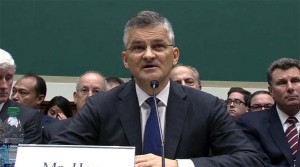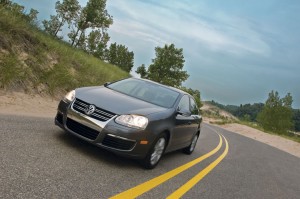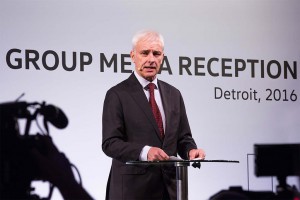Volkswagen has just two weeks to deliver an acceptable solution to its dirty diesel problem, according to the orders of a federal judge. But regulators in California are starting to worry that the maker might not be able to come up with a satisfactory fix short of scrapping tens of thousands of those vehicles.
As a result, a senior official with the California Air Resources Board says the organization is considering whether to let those vehicles continue to operate while falling short of both state and federal clean air mandates.
“Our goal has been to fix the vehicles and return them to their certified configuration as expeditiously as possible,” CARB enforcement chief Todd Sax said during a legislative hearing in Sacramento. “Unfortunately, this may not be possible.”
His comments came as VW accepted the resignation of Michael Horn, the CEO of its U.S. operations. Horn came under fire when, during a Congressional hearing in Washington last year, he declared that VW’s diesel cheating was the result of only a small number of rogue engineers. This week, a prosecutor in Germany revealed that 17 VW employees are under investigation.

VWoA CEO Michael Horn took heat for telling a Congressional committee the cheating was the work of a "couple of software engineers."
(For more on Horn’s sudden departure, Click Here.)
The scandal was kicked off last September when the U.S. Environmental Protection Agency charged VW with using a so-called defeat device to illegally pass emissions tests involving its 2.0-liter turbodiesel. The maker acknowledged the deception and later confirmed it cheated on tests involving a 3.0-liter diesel, as well. All told, more than 500,000 vehicles sold in the U.S. are impacted, while the subterfuge involved 11 million VW diesels sold worldwide.
(German prosecutors target 17 in VW diesel scandal. For more, Click Here.)
According to CARB, as many as 70,000 VW and Audi vehicles using the suspect 2.0-liter turbodiesel are in operation in that state, with another 16,000 using the bigger six-cylinder diesel used in VW, Porsche and Audi models.
Repairs have already begun in Europe and other parts of the world. In most cases, that simply requires reprogramming the software on the affected vehicles. But the challenge is tougher in the U.S., which has far stricter diesel regulations. And California maintains even tougher targets.
An initial fix offered by Volkswagen was rejected. And last month, a federal judge in San Francisco gave the company until March 24 to come up with an acceptable solution. VW CEO Matthias Mueller this week said he expects to meet that target, but not everyone is as confident.
Industry sources caution that U.S. regulators are not yet convinced VW will be able to make repairs that not only meet emissions targets initially but that they can come up with a solution that won’t fail over time.
The subterfuge went on for seven years and during that period VW revised its engine technology several times. The newest models are considered likely to be brought into compliance. Older models may have a tougher time, so, one alternative would be to scrap some of the older vehicles impacted by the scandal.
But California regulators are considering a compromise that would improve the emissions while still falling short of their environmental targets. That would allow owners to keep operating the vehicles. A final decision has not been made, Sax said.
VW has already offered U.S. owners $1,000 in concessions. And it recently hired well-known specialist Kenneth Feinberg to oversee a compensation program. But the maker is also facing more than 500 lawsuits that could expand that payout. The U.S. Justice Department is seeking as much as $40 billion in fines as part of its own civil lawsuit.
This week, VWAG CEO Matthias Mueller warned the scandal could result in “substantial and painful” financial damage.
(VW’s former CEO alerted to diesel problem in early 2014, reports say. Click Here for more.)


